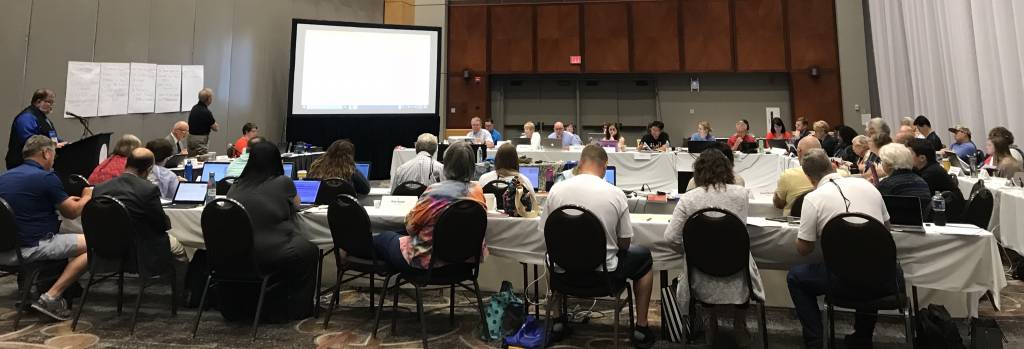Written by Robert Taylor, retired PC(USA) pastor and volunteer with Citizens Climate Lobby
Last June commissioners at the 223rd General Assembly voted to have our denomination become advocates for a climate policy solution called carbon fee and dividend. Shortly after the GA’s action a bipartisan bill incorporating this approach was introduced into the 115th Congress. Then on January 24, 2019 this legislation, The Energy Innovation and Carbon Dividend Act, HR763, was re-introduced into the 116th Congress. This bill outlines a particular way that carbon fee and dividend can help lower carbon emissions and help climate change. In just a few months the bill has garnered 37 cosponsors. In coming months the bill will be debated in committees and a companion bill will be introduced into the Senate. If enacted, emissions would be reduced 40% within 12 years and 90% by 2050. Coupled with strong mandates to phase-out fossil fuels, this policy offers a chance to avert the worst impacts of climate change. The task of getting Congress to pass this legislation should now become a focus of our denomination’s climate care ministry.
Support for this approach is widespread and significant:
Support from scientists: After years of issuing reports on the increasing urgency to reduce greenhouse gas emissions the U.N. IPCC report released last November recommended a specific action: “A price on carbon is central to prompt mitigation”.
Support from Economists: On January 17th forty-five eminent economists, including 27 Nobel Prize winners in Economics, former Treasury Secretaries, chairs of the Federal Reserves, and nearly every Republican and Democratic chair of the Council of Economic Advisors since the 1970s issued a statement in the Wall Street Journal calling for a national carbon fee and dividend policy. This endorsement counters those who argue that reducing emissions will harm the economy. The most prominent economists from both parties are now on record telling us otherwise.
Support from faith groups: Shortly after our General Assembly acted, the national body of the Episcopalian Church also voted to support the carbon fee and dividend approach. U.S. Catholic Bishops’ Domestic Chairman has endorsed HR763 as “an important step forward in addressing climate change”. Based on General Assembly policies, the Office of Public Witness of PC(USA) authored a statement of support in late 2018. Crucial for faith community support is the way the carbon dividend provides compassion and economic justice for low and middle income families through the transition to a clean energy economy.
Support from Green New Deal advocates: Congresswoman Alexandria Ocasio-Cortes, a leader among those calling for a “Green New Deal”, has affirmed the polluter-pays principle which underlies the idea of taxing carbon emissions. If coupled with carbon fee and dividend policies, this movement’s call to set urgent goals, will energize the public to demand action from Congress.
How Fee and Dividend works: A steadily increasing fee is imposed on coal, oil and gas companies, at the mine, well or port of entry, according to their greenhouse gas content. This makes these fuels more expensive which drives down demand, reduces emissions, and gives a competitive edge to clean energy development. 100% of the revenues, less administration costs, are distributed equally to American households as monthly dividends (within 5 years of implementation the average household would receive about $200/month). This spurs the economy and helps low and middle income families cope with increased energy costs. Then, to protect American businesses and to encourage our trading partners to adopt similar policies, a carbon adjustment system is established at the border. Carbon fees would be collected on goods imported from countries without an equivalent price on carbon, and U.S. exports to those countries would receive rebates on fees paid. This mechanism will encourage all our trading partners to adopt similar policies; eventually creating a truly global solution.
For more information: www.energyinnovationact.org; carbon fee and dividend policy; or, contact Courtney Forbes, at 2widdershins”at”gmail.com.
